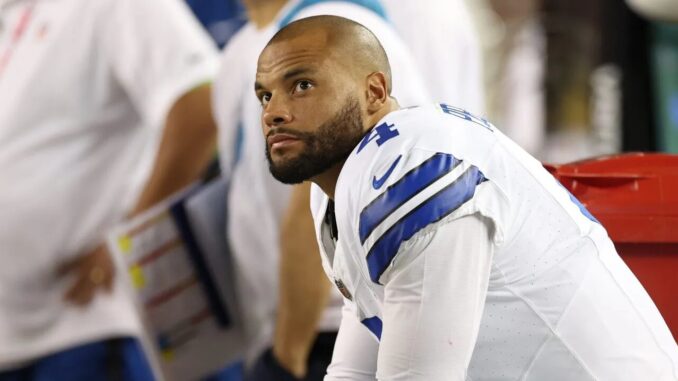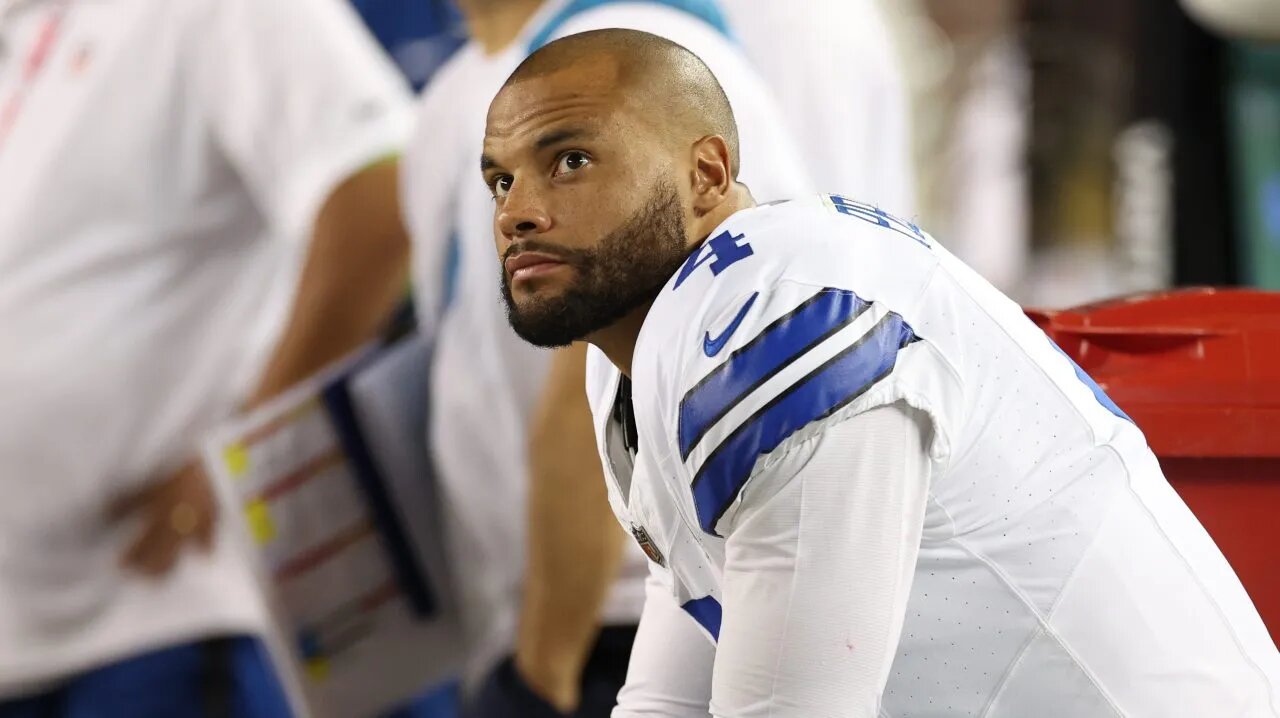
If Dak Prescott reaches free agency, that’s a problem for the Cowboys
Dak Prescott’s contract situation and future with the Dallas Cowboys is entering unprecedented territory. Rarely does a quarterback of his level, at his age, enter free agency, and yet it looks more like a real possibility with each day that he doesn’t have a new deal in Dallas.
Prescott had a career year in 2023 and was ranked ninth in Mike Sando’s 2024 Quarterback Tiers created from the opinions of executives and coaches around the league. He’ll be 32 years old next year with no sign of his game declining. Of course, there’s always a chance that he gets hurt this season but unless it’s a rare injury that affects his ability to throw, it won’t affect the ceiling of how high he’ll get paid.
Prescott’s path toward unprecedented leverage began in 2019 when he was eligible for his first extension. After a two-year negotiation process, Prescott finally signed a four-year, $160 million-dollar extension with $126 million guaranteed. Athletes First, Prescott’s representation, made the ingenious move to force the Cowboys to use a second tag on Prescott even though they would sign an extension in 2020. Tagging Prescott a third time is virtually impossible because he would get a 144 percent raise over his cap hit the previous season, which was $66.9 million.
Ideally, the Cowboys would have extended Prescott this offseason but owner and general manager Jerry Jones would have to be willing to reset the market because Prescott has all the leverage. Prescott knows if he doesn’t sign this season, he’ll likely be the highest-paid player in the league after free agency next season.

“There’s no way I would sign a deal if I were Prescott unless it’s crazy,” a former general manager told The Athletic. “So I would only ask for crazy to see where it goes.”
According to a league source, if a deal gets done soon, it should be somewhere around four years, $240 million, putting him at $60 million per year. Joe Burrow, Jordan Love and Trevor Lawrence all got contracts that average $55 million per year. Of course, we can’t know what Prescott is asking for exactly but with how quarterback deals have trended and with what he knows he’ll be able to get when teams bid for his services next season, it’s not unreasonable to ask for $60 million or more. Prescott would likely get $63 million to $65 million per year in the open market, especially since there’s a good chance the salary cap will increase again next offseason, but maybe he’d be happy staying in Dallas for $60 million if the deal gets done soon.
It’s also somewhat understandable that Jones is unwilling to reset the market by that much. But what other choice does he have? He doesn’t have another viable starting quarterback on the roster. Maybe he tried to create some leverage by trading a fourth-round pick for Trey Lance last offseason, and although Lance showed some promise this preseason, he also showed he’s still not ready to be a starter in this league, throwing five interceptions against the Chargers in the preseason finale.
Next year’s draftable quarterback class is expected to be a weak one. There could be quarterbacks that emerge and enter the first-round discussion, but even if they do, the Cowboys are likely not going to draft that early because Prescott should play at a high level as he has for almost his entire career in the regular season. Since 2020, among quarterbacks with at least 1,000 pass attempts, Prescott ranked fourth in expected points added (EPA) per dropback, fifth in yards per attempt, and eighth in total touchdown passes.
The only argument one could make against paying Prescott a market-resetting deal is that he hasn’t won consistently in the playoffs — he’s 2-5 in the postseason. The Ringer’s Steven Ruiz showed Prescott has performed better than average in the playoffs. He did have a couple of bad games against the 49ers in 2022 and 2021 but also had elite performances against the Packers in 2016 and the Rams in 2018. The problem is that the Cowboys’ defense gave up more than 30 points in all five of his playoff losses. Sure, in a perfect world, you hope your quarterback can overcome all this but realistically, there might be only one quarterback who can do it consistently and he plays for the Chiefs.
Prescott’s playoff record might be exactly why Jones is hesitant to pay the quarterback what he wants.
“In Jerry’s mind, I think he’s sitting there saying a bunch of 25-to-27-year-old studs (Burrow, Lawrence and Love) just had to settle for mid-50s, including the guy (Love) who just kicked his ass in the playoffs,” a league source told The Athletic. “I know that the QBs don’t play each other but it’s Jerry Jones. He’s thinking, ‘Why would I then make him the first $60 million per year player?’”
Also, Jones has been notoriously cheap when it comes to spending. The Cowboys have been one of the more frugal franchises in the last decade, usually middle of the pack or lower with spending. This year, after paying CeeDee Lamb a four-year, $136 million-dollar extension, they still rank 28th in cash spending. The Cowboys will also have to make Micah Parsons the highest-paid non-quarterback in the league soon and they’ll have to extend guard Tyler Smith, who is elite at his position, after that.
The Cowboys can extend their stars including Prescott and stay under the cap with some maneuvering, but they would have to consider paying players early, something Jones hasn’t done much.
“I think it’s one of the more short-sighted approaches of any team in the league,” the league source said. “It really just boggles my mind because (Jones) still does get the deals done. If he was letting guys walk, then it’d be different. If he’s kind of like Green Bay-ish or Pittsburgh-ish or Cincy-ish or if they had legitimate cash constraints and they let guys play out their deals because they really try to be very picky in who they bring back … but with the Cowboys, they always drag it out. They wait for the last minute and they still do it and so (Jones is) just paying more than he has to almost every single time.”
The Cowboys certainly don’t have cash constraints. According to data from Forbes compiled by JP Morgan Asset Management, the Cowboys ranked first in revenue last season by a wide margin, making $1.1 billion. The Raiders, who were second, made $729 million in revenue. The Cowboys have the cash to pay players early and save money to sign better role players and improve their roster but they don’t. They’re a competitive team because they draft incredibly well and it looks like they have another strong draft class this year, but they won’t be true championship contenders unless they change how they do business. And if they let Prescott go in free agency, they’ll likely be a middling to bad team.

Leave a Reply